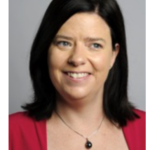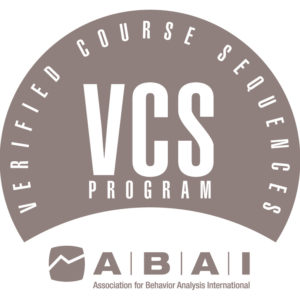
Nicole Davis
PhD
Director, Applied Behavior Analysis Program; Associate Clinical Professor Applied Psychology
YOU ARE BOUVÉ

Video: Our ABA program, your way…
Since 1976, Northeastern University has provided quality graduate instruction in applied behavior analysis (ABA). Along with our hybrid program in Charlotte NC, our online graduate program is designed to develop teaching and intervention skills based on the principles of the science of behavior analysis.


The MS in Applied Behavior Analysis program is verified by the Association for Behavior Analysis International (ABAI) as meeting the coursework requirements to sit for the 5th Edition Behavior Analyst Certification Board (BACB) exam.
Our program provides the experience needed to oversee the educational and behavioral programming of individuals with autism or behavioral needs.
Hundreds of our graduates have gone on to become Board Certified Behavior Analysts (BCBA™), working to improve the lives of clients and consumers all over the world.
Online
Our online courses make use of cutting-edge technology to permit flexible schedules while creating opportunities for increased interactions between students and instructors. Courses are designed to allow students to complete lectures and other learning tasks on their own time across the semester.
Hybrid ABA in Charlotte, NC
The hybrid program on our Charlotte campus is delivered online and in person. The industry-aligned curriculum allows you to work independently for most of the semester, with face-to-face instruction at critical points in your studies.
Degree types:
– MS in Applied Behavior Analysis
Study options:
– Online
– Hybrid — online/on-ground (Charlotte, NC)
Application deadlines:
On-ground: Aug 1
GRE: Not required
F-1 Eligibility:
Due to the online nature of this program, Northeastern University cannot support students, who require F-1 non-immigrant status, to study within the United States. However, students, who wish to pursue this program from their country of residence, are welcome to apply.
Notes:
Evidence-based practice in learning experience design
Verified Course Sequence by ABAI
45-year history of instruction in ABA
Optional Supervised Fieldwork
Northeastern University became one of the first universities to offer a master’s degree in applied behavior analysis when it was created in 1976. In 2013, the MABA program became a fully online program which employs evidence-based practice in applied behavior analysis. In 2019, our curriculum was updated to meet new 5th edition task list requirements of the BACB and to strengthen the skillsets acquired by our students. BACB VCS pass rates can be found at: BCBA-Pass-Rates.
For those students looking to connect in real-time with professors and classmates around the globe, most courses also have the option to attend synchronous meetings. The extensive access to online resources supports a connected, flexible experience that fits into even the busiest life.
Our online program includes 7 core courses in behavior analysis plus an additional 3 courses that extend the student’s familiarity with clinical procedures and with the research supporting their use.
Students are given the option of completing supervised fieldwork on their own or by enrolling in courses that provide supervision through the Concentrated Supervised Fieldwork option.
A professional portfolio is the capstone for the Master of Science program. This electronic portfolio is compiled of competencies students have achieved while in the program. Evidence is gathered from projects that students conduct as part of their coursework, including assessments, teaching protocols, and intervention programs.
Graduates are fully prepared for board-certified behavior analyst (BCBA) coursework requirements and able to demonstrate assessed skills.

Free Career Guide:

Explore possible career paths and identify the essential skills needed to advance in the industry.

Providing Over 45 Years of Instruction in Applied Behavior Analysis
The Northeastern University Applied Behavior Analysis Programs are designed to give students options to allow them to learn and meet their goals wherever they are. Thus, they have the option to complete supervised fieldwork requirements through a Northeastern provided course, or on their own.
Students may enroll in elective practicum courses to gain experience in the field under the supervision of NU faculty. These courses are designed to meet the requirements set forth by the BACB for Concentrated Supervised Fieldwork. Our faculty supervisors bring a rich array of practical experience in public and private settings. Students enrolled in practicum courses meet twice weekly with their assigned faculty supervisors in group and individual formats. Students who meet the stated requirements in all four practicum courses complete 100% of the fieldwork needed to sit for the BCBA examination. Students who are already employed in a behavior analytic role may be eligible to complete their fieldwork in their current professional setting. Other students may gain assistance from NU faculty in identifying practical settings for fieldwork.
The Professional Portfolio is the capstone for the Applied Behavior Analysis Programs at Northeastern University. This portfolio documents the student’s behavioral competency in critical clinical skills. These skills include ethical decision-making, assessing behavior, planning for behavior reduction, teaching and training, and professional supervision and consultation skills.
Each student completes projects associated with the above clinical skills, and each project culminates in professional documents to be included in the student’s Professional Portfolio. A faculty member reviews and signs each project in the Professional Portfolio. The faculty member’s signature indicates that the student has achieved the faculty-established standards for the project. Graduates are encouraged to use their Professional Portfolio when applying for employment.

Northeastern’s ABA program is a sponsor of the Women in Behavior Analysis organization
Northeastern’s master’s program in Applied Behavioral Analysis was recently ranked among the top ABA programs in the country.
A Bachelor’s Degree with a minimum GPA of 3.0.
Related work experience with individuals with special needs is a plus, but not required.
Completed Application Form
Statement of Purpose
2 Letters of Recommendation
Official Transcripts
Application fee (Note: This fee can be waived if you attend a virtual information session.)
Please reach out to us.
Nicole Davis, PhD, BCBA
Program Director and Associate Clinical Professor
617-373-5917
Please choose from the following two mailing addresses:
1. If you are mailing your documents from within the U.S., use this address:
Northeastern University
Bouvé College of Health and Sciences
Applicant ID: XXXXXXX (insert your Applicant ID number)
Graduate Application Processing Center
P.O. Box 1434
Portsmouth, NH 03802
2. If you are mailing your documents from outside the U.S., use this address:
Northeastern University
Bouve College of Health Sciences
Applicant ID: XXXXXXX (insert your Applicant ID number)
Graduate Application Documents
360 Huntington Ave.
Boston, MA 02115 USA
Please include your 7-digit Applicant ID with your documents. Northeastern uses the Applicant ID to match your document with your official admissions record. If you have more than one Applicant ID, use the one associated with the College/Degree/Program in which you plan to enroll. Your Applicant ID may have been emailed to you by your graduate college admissions office.
If you do not know your Applicant ID, follow these steps:
1. Login to your application (ApplyYourself) account
2. Click EDIT APPLICATION
Your Applicant ID will appear towards the top of any introductory language or content, and/or can be referenced on the left-hand side of the screen menu under the Important Links section. There you will see “Check Your Applicant ID XXXXXXX” (where XXXXXXX will be your 7-digit unique ID).
Life can be quite chaotic taking classes, while balancing a career and family. I needed a master’s program that fit into my life that didn’t take away from the things that were important to me. That is why I chose Northeastern University’s MS in ABA program. The online format afforded me the time to reach my goals academically, continue on my career path, and spend quality time with my family. I would recommend Northeastern’s MS in ABA program to anyone, but particularly those balancing a family and career.
The ABA programs at Northeastern are excited to partner with organizations in the community providing behavior-analytic services to clients in need. The partnerships allow student-employees to practice what they are learning and have a streamlined path to the best option for accruing supervised fieldwork.
Organizations interested in partnering with the Northeastern ABA graduate programs should contact Nicole M. Davis at [email protected].

PhD
Director, Applied Behavior Analysis Program; Associate Clinical Professor Applied Psychology

PhD, BCBA-D, LABA
Assistant Clinical Professor; Director of Supervision for Applied Behavior Analysis Programs Applied Psychology
Paula Braga-Kenyon, PhD, BCBA-D
Mike Dorsey PhD, LABA, BCBA-D
Ksenia Gatzunis PhD, BCBA-D
Shawn Kenyon, PhD, BCBA
Amanda Laprime, PhD, BCBA-D
Hanna Rue, PhD, BCBA-D
Ashley Williams, PhD, BCBA
Yes, all of our courses are provided in an online format.
Our courses are asynchronous. That is, students are not required to log in at a specific time each week to participate. Rather, course materials are made available each week, and students are expected to complete required readings, view lecture materials, and complete assignments and discussion requirements by the end of the week.
Some of our courses do include optional synchronous video discussions during select weeks of the semester.
Classes have up to 19 students.
There are many opportunities to interact with other students and with faculty members within our courses. Weekly discussions, projects, presentations, and other assignments allow for students to interact with one another and with the instructor on a weekly basis. Some courses also include collaborative assignments and group-based teaching pedagogies that create the opportunity for interactions
Students may either achieve their supervised fieldwork hours under the supervision of a BCBA at their place of work, or they may achieve their experience hours under the supervision of an NU faculty member, by taking our elective Intensive Practicum courses. One semester of Intensive Practicum provides students with up to 375 supervised fieldwork hours. (See the BACB Handbook.)
Students may take the Intensive Practicum courses at any point after their first semester in the program, alongside their other coursework. Alternatively, students may take the Intensive Practicum courses after they have completed their other coursework.
In some cases, students may transfer credits from a previous institution, but only if those courses align closely with our own. Students may transfer up to 3 graduate level courses (9 credit hours), provided they received a 3.0 or better in those courses, provided the coursework was completed within the last 5 years, and provided the course did not lead to a terminal degree (e.g., a master’s degree).
It is important to note that our program is a verified course sequence (VCS); when students transfer coursework from a previous institution, they are no longer following an approved course sequence. Students who transfer coursework will need to submit evidence of all coursework to the BACB in order to sit for the BCBA exam.
It is ultimately up to the BACB to determine if students have completed all of the necessary coursework prior to sitting for the BCBA exam. In order to transfer credits, students must first apply to the program. Once accepted and enrolled, students complete a Petition to Transfer Credits form which must be approved by the Program Director and the Bouvé Graduate Office.
The cost is a per-credit rate (subject to change) for 30 credits.
Tuition is the same for in-state and out-of-state students. Students may take advantage of financial aid opportunities. See more about financial aid.
Yes, students can take advantage of Northeastern’s financial aid opportunities.
Most of our graduates plan to become Board Certified Behavior Analysts after completing our program. Many of our graduates work in schools or private agencies, providing oversight of behavioral and educational programming for individuals with autism and related disabilities. Many of our graduates also work in research or in academia. See our website for a sampling of our alumni and where they work.
| Jan Allar, M.S., BCBA | Behavior Consultant, William Beaumont Hospital (Detroit, MI) |
| C. Brooke Allen, M.S., BCBA | Behavior Analyst, Behavior Based Learning, LLC (Springfield, MO) |
| Ellen Attaliades, M.S., BCBA | Chief Executive Officer, The Edinburg Center (Lexington, MA) |
| Tom Barnes, PhD | School Psychologist, Council Rock School District (Newtown, PA) |
| Joseph Bartholomew, M.S., BCBA | Supervisor of Autism Programs, Boston Public Schools (Boston, MA) |
| Casey Bethay, M.S., BCBA | Behavior Specialist, The Ivymount School (Baltimore, MD) |
| Nick Chappell, M.S., BCBA | President and Founder, Verbal Beginnings, LLC (Ellicott City, MD) |
| Rishi Chelminski, M.S., BCBA | Director of Behavioral Services, Services for the Underserved (New York, NY) |
| Ruth DeBar, PhD, BCBA-D | Associate Professor, Caldwell College (Caldwell, NJ) |
| William Dube, PhD, BCBA | Associate Professor of Psychiatry and Pediatrics, UMass Medical School (Worcester, MA) |
| Gesell Gavidia-Layton, M.S., BCBA | Program Director, Behavior Analysis, Inc. (Davie, FL) |
| Lenwood Gibson, PhD, BCBA | Assistant Professor, Queens College (New York, NY) |
| D. Daniel Gould, PhD, BCBA-D | Chief Clinical Officer- UAE, The New England Center for Children (UAE) |
| Richard Graff, PhD, BCBA-D | Clinical Director, The New England Center for Children (Southboro, MA) |
| Jamie Granatino, M.S., BCBA | Regional Coordinator, Early Autism Project (Tampa, FL) |
| Megan Hafen, PhD, BCBA | Clinical Director, Addison Behavioral Resources (Los Angeles, CA) |
| Brandon Herscovitch, PhD, BCBA-D | Executive Director, ABACS, LLC (Woburn, MA) |
| Arianne Kindle, M.S., BCBA | Director, Kindle Behavior Consultants (Burlington, MA) |
| Elisabeth Kinney, M.S., BCBA | Behavior Analyst, Behavioral Learning and Leadership (Hallowell, ME) |
| Candace Colon Kwedor, PhD, BCBA | Senior Clinical Director, The May Institute (Randolph, MA) |
| Joseph Lambert, PhD, BCBA | Assistant Professor, Vanderbilt University (Nashville, TN) |
| Jill Larsen, M.A., BCBA | Executive Director, The Futures Clinic, Inc. (Beverly, MA) |
| Russell Maguire, PhD, BCBA-D | Assistant Professor and Chair, Simmons College (Boston, MA) |
| Kimberly Mitchell, M.S., BCBA | Clinical Director, The COR Behavioral Group (New York, NY) |
| Pamela Olsen, MS.Ed., BCBA | Program Director- Abu Dhabi, The New England Center for Children (UAE) |
| Becky Parenteau, M.S., BCBA | Clinical Director, Alaska Center for Autism (Eagle River, AK) |
| Jill Parkin, M.A., BCBA | Special Education Coordinator, Arlington Public Schools (Arlington, MA) |
| Sacha Pence, PhD, BCBA | Assistant Professor, Department of Psychology, Auburn University (Auburn, AL) |
| Griffin Rooker, PhD, BCBA | Research Scientist, Neurobehavioral Unit, The Kennedy Krieger Institute (Baltimore, MD) |
| Flint Simonsen, PhD, BCBA | Associate Professor of Special Education, Eastern Washington University (Cheney, WA) |
| Mary Tinsley, M.S., BCBA | Clinical Supervisor, Jigsaw Junction (Seattle, WA) |
| Nicholas Vanselow, PhD, BCBA-D | Assistant Professor, Graduate Program Director, Salve Regina University (Newport, RI) |
| Joseph Vedora, EdD, BCBA-D | Vice President of Behavioral Services, The Evergreen Center (Milford, MA) |
| Preeyavata Wanapun, M.S., BCBA | Clinical Supervisor, Easter Seals of Southern California (Chino Hills, CA) |
| Julius Warindu, PhD, BCBA-D | Clinical Director, New England Behavioral Services (Attleboro, MA) |
| Brittany Wolfson, M.S., BCBA | Organizational Behavioral Health Specialist, People’s Care (Los Angeles, CA) |